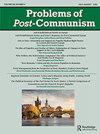后共产主义欧洲对寻求庇护者的公众舆论:比较视角
IF 2
2区 社会学
Q2 POLITICAL SCIENCE
引用次数: 1
摘要
本文章由计算机程序翻译,如有差异,请以英文原文为准。
Public Opinion toward Asylum Seekers in Post-Communist Europe: A Comparative Perspective
ABSTRACT The study examines public attitudes toward asylum seekers in seven post-communist countries—Czechia, Estonia, Hungary, Lithuania, Poland, Russia, and Slovenia—from a cross-national comparative perspective. Based on the 2016 European Social Survey, the findings reveal that the level of exclusionary attitudes toward asylum seekers in post-communist Europe is higher than that in Western Europe, although it varies meaningfully across post-communist countries. The study considers cross-country variance in the exclusionary attitudes in light of countries’ structural characteristics, including ethno-cultural composition of local populations. Individual-level analysis examines divides in the exclusionary attitudes along socio-economic, ethnic, and religious lines within the native-born populations.
求助全文
通过发布文献求助,成功后即可免费获取论文全文。
去求助
来源期刊

Problems of Post-Communism
POLITICAL SCIENCE-
CiteScore
4.00
自引率
12.50%
发文量
33
期刊介绍:
The post-communist countries are the most rapidly changing societies of Europe and Asia. For insight into this twenty-first century revolution, there is no better source than Problems of Post-Communism. Emphasis is placed on timely research covering current economic, political, security, and international developments and trends in Russia and China, Central Europe and Central Asia, Latin America, and Southeast Asia. Clarity and readability make the articles fully accessible to researchers, policy makers, and students alike.
 求助内容:
求助内容: 应助结果提醒方式:
应助结果提醒方式:


